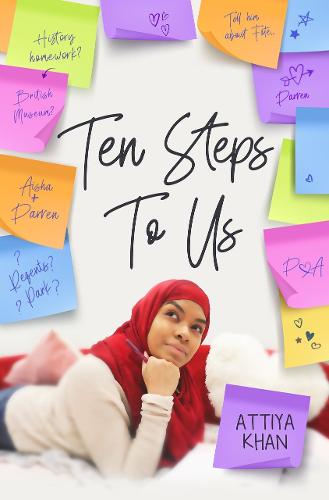This is not just a teen romance, if it was, I probably wouldn’t have enjoyed it anywhere near as much as I did. Yes, the plot is romance based: Girl meets boy, girl falls for boy, girl’s best friend wants to date boy, girl dates boy but has to keep it a secret etc. etc. But that isn’t the story. The real story is the way that the author explores what it means to be a teenage Muslim girl in our western society, who is she? What is her identity? Where does she belong? Can she have what she really wants (assuming she actually knows what that is)?
Aisha is a normal 16 year old girl who wears a hijab because she is a Muslim. The simple act of putting on a headscarf means so much to her, it is part of her faith, part of her identity and a symbol of who she is, but that same simple act exposes her to casual acts of racism from a couple of teenage thugs. Threats to pull the scarf from her head terrify her, she has never had to fear that before! Fortunately for her, Darren, a new boy at school, steps in to scare them off.
As the relationship between Aisha and Darren develops the book explores all the usual worries that teenagers have, Aisha’s best friend fancies Darren and “lays claim” to him early on. The relationship between the two girls is complex and adds depth to the story, issues around social media and “slut-shaming” are tackled – although no real solutions are offered. Can Aisha depend on her friend when she reveals her relationship with Darren?
In a book based very heavily on relationships, the family is brought to life exceedingly well, the Pakistani culture and Muslim religion are intertwined and some of the issues that are often sensationalised in the UK press are explored. Arranged marriage, the role of wives in that marriage and the expectations of good Muslim behaviour are touched on in a manner which separates culture and religion. Aisha’s parents, her brothers and her “Aunties” all add to the struggles that she faces in trying to work out who she is and what she wants. Some of their words and actions make Aisha doubt her faith.
If she can find the balance between being a teenager in a Western society and being a devout Muslim (without losing her faith) perhaps she can hold on to Darren.
Darren is also well developed as a character (once Aisha decides she needs to know more about him) and Attiya looks at the differences in attitudes from one place to the next. East London and Kent are very different places to grow-up, a truth that reflects on the nature of the UK. Where you live shapes your experiences, which in turn shapes who you are. I suspect that much of the material is biographical, as it flows so well and doesn’t feel forced or shoe-horned to fit an overarching narrative.
This is more than just a romance, although it was a romance that I enjoyed. If you want something that challenges perceptions or offers a window for children to see themselves, then this is a great book to start with.

